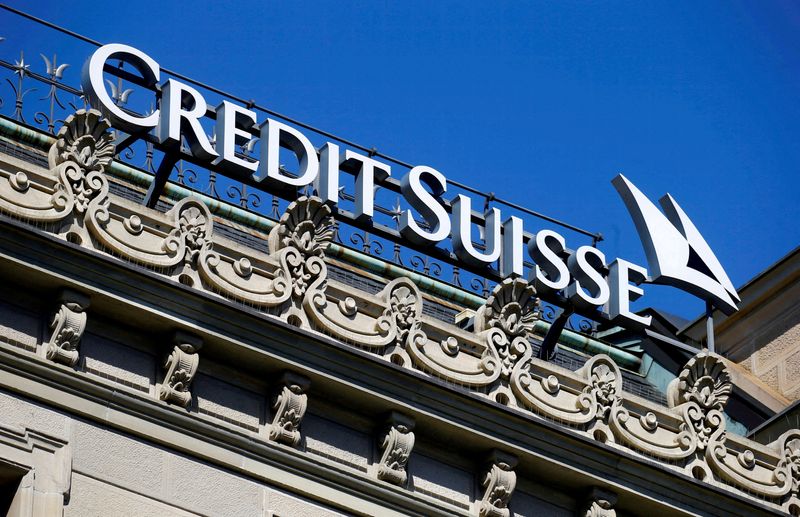By Noele Illien
ZURICH (Reuters) - Credit Suisse (SIX:CSGN) shares slumped by as much as 30% on Wednesday after its largest shareholder said it could not provide further support, prompting the Swiss bank's CEO to make new assurances on its financial strength.
Saudi National Bank (SNB), which holds 9.88% of Credit Suisse, said it would not buy more shares on regulatory grounds.
Shares in Credit Suisse, which is battling to recover from a string of scandals that have undermined the confidence of investors and clients, were down about 17% in early afternoon trading, after shedding as much as 30% to a new record low.
In a sign that regulatory authorities are tracking developments, European Central Bank (ECB) officials contacted lenders it supervises to ask about financial exposures to Credit Suisse, a source familiar with the matter told Reuters, confirming a Wall Street Journal report.
Meanwhile, the falls in Credit Suisse's market value also prompted action among politicians with French Prime Minister Elisabeth Borne saying that Finance Minister Bruno Le Maire would speak with his Swiss counterpart in the coming hours.
"The Credit Suisse situation is for the Swiss authorities to deal with," Borne said in the French Senate.
Credit Suisse CEO Ulrich Koerner moved to calm nerves, saying the bank's liquidity base remained strong and was well above all regulatory requirements. Koerner had said earlier in the week Credit Suisse's liquidity coverage ratio averaged 150% in the first quarter of this year.
The Swiss National Bank declined to comment on the fall in shares Credit Suisse shares.
Credit Suisse on Tuesday published its annual report for 2022, which said it had identified "material weaknesses" in controls over financial reporting and had not yet stemmed customer outflow.
Switzerland's second-biggest bank had seen fourth quarter customer outflows rise to more than 110 billion Swiss francs ($120 billion).
Exane analysts said they saw a bailout by the Swiss National Bank and financial regulator Finma, possibly with one or more other banks, as the "most likely scenario" facing Credit Suisse.
They also raised the possibility of a u-turn by Saudi National Bank, which upped its stake in Credit Suisse last year as part of a capital raise to bolster its financial strength.
"We cannot because we would go above 10%. It’s a regulatory issue," SNB Chairman Ammar Al Khudairy told Reuters on Wednesday.
'GAME-CHANGING'
Credit Suisse's plunging stock price has re-ignited jitters among investors about the resilience of the global banking system after the collapse of Silicon Valley Bank last week.
"There has to be some kind of game-changing decisive action to reverse and stabilise the situation," Exane's analysts said.
Among the biggest decliners in European banks on Wednesday were French lenders Societe Generale (EPA:SOGN), down 12%, and BNP Paribas (EPA:BNPP), which fell by 9%.
Ralph Hamers, CEO of Swiss rival UBS, speaking at a Morgan Stanley (NYSE:MS) conference on Wednesday, said UBS had benefited from recent market turmoil and seen money inflows.
"In the last couple of days as you might expect we've seen inflows," Hamers said. "It is clearly a flight to safety from that perspective, but I think three days don't make a trend."
The cost of insuring the company's bonds against default shot up. Five-year credit default swaps on Credit Suisse debt widened to 574 basis points from 549 bps at last close, based on data from S&P Global (NYSE:SPGI) Market Intelligence, a new record high.

(Graphic: Credit Suisse goes off piste - https://www.reuters.com/graphics/CREDITSUISSEGP-STOCKS/akveqegdgvr/chart.png)
($1 = 0.9173 Swiss francs)